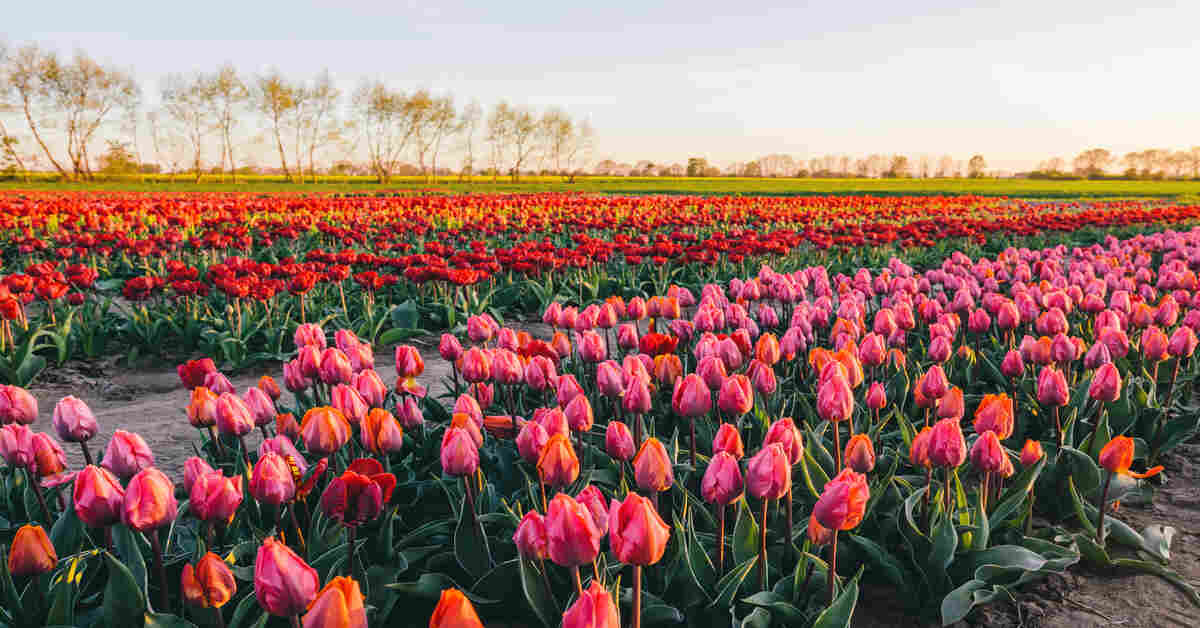
No flower is more associated with the Netherlands than a tulip. In the spring millions of fields of color grow in the Dutch country, and the scene is painted to shimmer with glittering strips of red, yellow, pink, and violet. To tourists, it is not merely watching tulips, but a national icon of beauty, perseverance and tradition. This full schedule of tulip season will assist you in making plans and preparations beforehand, the intriguing history behind the flower and discovering the most popular locations to view the Netherlands in full blossom. Tulip time is a phenomenal scene in Europe whether you are a photographer, an admirer of nature or just want to have a wonderful spring break in Europe.
The history of tulips in the Netherlands dates back to the 16th century when the flowers were brought in the Ottoman Empire. Through their popularity, they became so beautiful that by the 17th century, they caused a mania called the Tulip Mania that rocked Dutch society. Tulips turned to be a symbol of wealth and prestige [their bulbs were sold on fortunes, and some rare varieties ran higher prices than gold]
The bubble did burst, but the Dutch tulip mania never died away. These flowers are still regarded today as national pride and millions of them are grown annually. Knowing this rich history will enhance your experience of the tulip season giving you the sense that these flowers are not just gorgeous but also have a historical background about them.
There is nothing like being on time when you are planning to visit tulips. The season lasts generally between the end of March and mid May with the peak bloom at around the middle of the month of April. Nevertheless, this is not set in stone, but it varies according to the weather conditions every year.
If you want to see both the flower fields and enjoy milder weather, aim for the first three weeks of April.
This is the largest flower park in the world, and it is recognized as the Garden of Europe where tulips of more than seven million flowering plants are on display. The exhibits are carefully planned in artistic designs and provide a kaleidoscope of color on 32 hectares. Walk in theme gardens, ride in flower fields around, and forget not to attend seasonal flower parades.
As a belt between Haarlem and Leiden, this area, called Bollenstreek, is the center of the tulip production. The most successful way of exploring its endless rows of color is to rent a bicycle. Tiny towns such as Lisse and Noordwijk are ideal places to stop at the local market and Dutch pastry.
To have a less noisy experience, go north to the Noordoostpolder. It has fewer crowds over its expansive tulip plantations and they are equally captivating. Tulip Boulevard Flevoland event is an annual cycling and driving tour featuring signposts that take place along the most beautiful routes every spring.
Tulips are everywhere even when you are staying in Amsterdam, whether in the floating flower market (Bloemenmarkt) or decorations in the canals. The city also hosts tulip festivals where arts are installed and it is also accompanied with flowers all through the month of April.
Tulip season is the busiest time for Dutch tourism. Accommodations, especially near Lisse and Haarlem, book out months in advance. Reserve hotels and tickets to Keukenhof early to avoid crowds.
Spring in the Netherlands can be unpredictable. Bring layers, comfortable walking shoes, and a light rain jacket. If you’re biking, windproof clothing is essential.
To avoid crowds and capture the best photos, visit gardens and fields early in the morning or later in the evening when the light is softer.
Tulip fields are a dream for photographers, but capturing their beauty requires a few smart techniques:
The Dutch celebrate tulip season with vibrant festivals that combine art, music, and heritage.
These festivals showcase not only the beauty of the flowers but also the Dutch dedication to craftsmanship and community spirit.
The Netherlands also is popularizing eco-friendly approaches in flower production and tourism. A significant number of growers adopt sustainable practices in order to minimize the use of pesticides and safeguard pollinators. Visitor responsibility includes sustainable farmer tours, riding bicycles over cars, and observing private farmland boundaries. Through responsible travel, the tulip fields will be made colorful even to the next generations.
1: Can I visit tulip fields for free?
Yes! The numerous tulip fields can be also seen free of charge through the public roads and cycling paths, particularly in such areas as Bollenstreek and Flevoland. Only to keep off private land, you see, the tulip season is to be gazed at and not to be bothered.
2: What other flowers bloom alongside tulips?
Tulip season often overlaps with other stunning blooms such as hyacinths, daffodils, and crocuses. These flowers create a layered landscape of color and fragrance that makes every visit even more enchanting.
Tulip season is not just a visual treat, but also a living history and tradition that links Dutch culture, history and natural beauty. Since the historic Tulip Mania of the 17th century, tulips have continued to be a strong symbol of rebirth and happiness even with the contemporary festivals that draw millions.
You can explore the gardens of Keukenhof, ride the bikes along the Flower Strip, or admire the flowers at a distance but this guide of the tulip season will make this experience unforgettable. Breathe the air of spring, and have time to smell the flowers of the Lowlands, and the simplicity of nature will make you remember how often the most simple of nature’s productions produce the most lasting impressions.
Leave A Comment